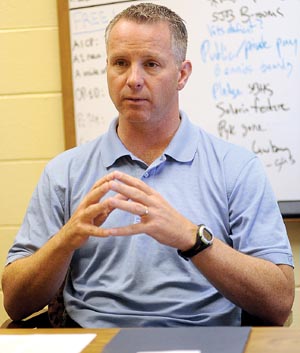State Sen. Anthony Cannella visited San Benito County this week and discussed several issues of local importance such as changes to enterprise zones, education funding reform and the need for a new water bond.
Cannella, R-Ceres, was the guest speaker at this month’s Lunch with Leaders event put on by the San Benito County Chamber of Commerce & Visitors Bureau. He spoke to more than 40 people at Ridgemark Golf & Country Club on Wednesday.
On politics in general, Cannella told the crowd that Republicans were an “endangered species” in Sacramento.
“But you just can’t sit back and say no to everything,” he said, noting how legislators need help from both sides of the aisle.
Cannella went into detail about changes to enterprise zones brought on by the need to improve the program and end abuses of the previous program – which caused Gov. Jerry Brown to sour on it. The governor and legislature are working within a new structure that provides better-controlled hiring subsidies through programs such as Calworks and a sales tax exemption on new and relocating manufacturing businesses. Cannella expects the program will be a significant benefit to San Benito County, he said.
He spent a lot of time discussing the recently approved and enacted Proposition 30. It is the school funding initiative sponsored by Brown that will provide more local control on how money is spent in districts while adding significant, additional funding to support students who are low-income, learning to speak English or living in foster homes. According to Cannella, this will be a direct benefit to places such as San Benito County and King City where a high percentage of students fall into those categories.
He pointed out that education funding cuts, deferrals and categorical budget restrictions took away local control and limited how budgets could be structured by spending categories.
“Schools had to go get a loan at market rate to fund their school operation” for deferred payments, he said. According to Cannella, “We built up our deferrals to about $10 billion.”
He mentioned that Palo Alto previously received about $14,000 per student, while San Benito High School got $5,874. About 70 percent of the Hollister School District students are English learners, low-income or in foster homes.
Future, local K-12 funding here would have been $8,500 per student, but will be approximately $10,300 based on the new formula. San Benito High, which was at $6,600 per student last year, will be at $10,300 next year.
“This was not a partisan fight – it was a geographical fight,” he said, as better-funded areas tried to hold on to the money.
Cannella identified the next big issue as the water bond. He said the state has not done anything with water for a long time and the infrastructure used for water is about 50 years old.
“The water bond is the best opportunity to mitigate that and build for our future,” he said. “We need water for storage, water for water quality and respiration of the delta.”
On the Delta Smelt, the endangered fish causing legal battles there, the environmentalists want increased flow for the Delta. Cannella said he focuses on the water storage component – which he believes addresses the environmental, climate, hydroelectric energy and availability by capturing the snowpack melt. Referring to the need for a water bond, he said that the state is suffering from “a water quality disaster.”
Cannella then took questions from the audience on a wide range of issues, including Calfire at the Hollister Municipal Airport and the eradication of zebra mussels at San Justo Reservoir. He said the increase in license fees for boats to fund detection and prevention of invasive species has started to build up to stop the spread of all invasive species.
As for immigration reform, Cannella said he believes it is a humanitarian and societal issue. He supported Assemblyman Luis Alejo’s driver’s license reform bill because immigrants are “living in the shadows,” he said, and the state is doing all it can to get Congress to take up the issue.
As for the topic of fracking for oil and gas, he is concerned about possible negative consequences and said he supports water monitoring. On the positive side, he said a study by the University of Southern California concluded that fracking could generate between 500,000 and two million jobs in California – with an average salary of $80,000 a year – and add $25 billion a year to the state in taxes. He believes Senate Bill 4 has put procedures in place, environmental protections, disclosures, water monitoring, chemistry and other provisions to allow safe extraction operations.
Finally, as an example of some problems unique to particular areas, Cannella said he believes that consumers will be paying an added 30 percent to 40 percent in energy costs to comply with the requirements for a minimum of renewable energy sourcing. At the same time, some state areas that use hydroelectric power and supported the renewable requirement have been exempted, and he believes the coastal communities should pay more to help out.
“However, it takes a long time to get anything done,” he said.










